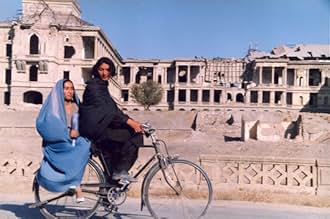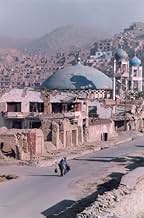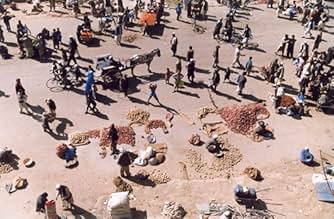AVALIAÇÃO DA IMDb
6,8/10
1,6 mil
SUA AVALIAÇÃO
Adicionar um enredo no seu idiomaIn a post-Taliban Afghanistan a young woman (Agheleh Rezaie) attends school against her conservative father's will, hoping to learn more about democracy to fulfill her dream of being the cou... Ler tudoIn a post-Taliban Afghanistan a young woman (Agheleh Rezaie) attends school against her conservative father's will, hoping to learn more about democracy to fulfill her dream of being the country's next president.In a post-Taliban Afghanistan a young woman (Agheleh Rezaie) attends school against her conservative father's will, hoping to learn more about democracy to fulfill her dream of being the country's next president.
- Direção
- Roteiristas
- Artistas
- Prêmios
- 4 vitórias e 2 indicações no total
- Direção
- Roteiristas
- Elenco e equipe completos
- Produção, bilheteria e muito mais no IMDbPro
Avaliações em destaque
Having loved 'The Apple' I was very much looking forward to seeing this, and though it has some very sad and beautiful moments as a whole I thought it lacked a sense of purpose. Having just seen the marvellous 'Osama', although perhaps a little unfair to compare it, that was more straight forward and had a far more emotional pull. The director does get amazing performances from the non-acting cast but occasionally the lack of experience does tell and you sense their just repeating what they've been told to say without really knowing why. It also felt a bit too long and would have been better without some scenes which were too similar to others. Not as good a film as 'The Apple' but worth seeing as there are some nice moments and it still manages to have a sense of humour despite the obvious terrible hardship these people have endured. (6/10)
This movie will be very moving, if you can sit still and take the opportunity to be drawn into the disturbing situation of a destroyed Kabul after 25 years of war. The story of Noqreh who dreams of becoming president while hiding her school attendance from her conservative father is very intense. Togehter with the sister-in-law and her sick child, Noqreh and her father are looking for a place to live in the ruins, they briefly stay in a crashed airplane and the bombed parliament building, before leaving the city for a more traditional country side... The camera observes, taking its time to capture the essence of the moments and the characters, including a staged debate between the two presidential candidates in the girl school. While the women start discovering some freedom (sun-umbrellas; dressing shoes), the men are struggling with keeping their faith in the new realities and everybody -including truck loads of returning refugees from Pakistan - is only trying to survive. At the moment, when a few helicopters flying over the head of the traveling family and they look up, I realized how deeply drawn I was into the movie and its very sad reality - so out of place seemed this modern technological machine compared to the mule-drawn carriage in a harsh landscape. Highly recommended, if you like Rohmer, Tarkowski or Mambety - 9 out of 10 stars!
Nogreh (Agheleh Rezaie) is a young woman living in a post-Taliban Afghanistan. She ultimately seeks to be educated, and finds solace in a girl school promoting new ideals and attitudes to women. Even though the Taliban have been defeated in the country, old ways are still present and burqa's are still preferred. She lives with her Conservative father and her sister-in-law Leylomah, who is searching for her missing husband who has not returned from war. Also, Leylomah has a baby who she is struggling to feed after her milk dries up. Amongst these struggles, Nogreh is running for class president and uses a Pakistani refugee to help with her ultimate goal which is to become President of Afghanistan.
The title comes from Federico Garcia Lorca's poem Lament for Ignacio Sanchez Mejias, which tells the story of a famous bullfighter tragically coming to an end in the ring. It is repeated several times by the Pakistani character named 'Poet' (Razi Mohebi). Mejias was a real and popular figure in Spain, who returned to bullfighting after a long spell out only to be killed. The character of Nogreh has high hopes after Afghanistan is rejuvinated only to be disappointed by a country set in its ways. Although it is clearly an improvement, attitudes to women are still the same and are seen as the inferior sex. This is most evident in the scene where she poses for photographs which she plans to use in her class president campaign, only to have the photographer laugh in her face upon discovering she wants to eventually run for President of the country. While Lorca's poem is tragic and romantic, At Five in the Afternoon is observant and naturalistic.
It would be easy, given the recent history of Afghanistan, to weave a tale of despair and woe, but director Samira Makhmalbaf tells a story that is full of hope. This hope comes from the character of Nogreh, who is brilliantly portrayed by Rezaie. Although she is ultimately looked down upon, and is scared of her father finding out about her radical attitudes, she is determined, and represents Makhmalbaf's hope of a new generation of women that will rise up and compete against the men who have dominated the country for years, and have ultimately led to the deaths of thousands of its inhabitants and many wars. The underlying messages aren't rubbed in your face; they are instead laid out in real situations. The film won Jury Prize at Cannes, and is a shining light in what will hopefully become a New Wave in Middle Eastern film-making - God knows they have stories to tell.
www.the-wrath-of-blog.blogspot.com
The title comes from Federico Garcia Lorca's poem Lament for Ignacio Sanchez Mejias, which tells the story of a famous bullfighter tragically coming to an end in the ring. It is repeated several times by the Pakistani character named 'Poet' (Razi Mohebi). Mejias was a real and popular figure in Spain, who returned to bullfighting after a long spell out only to be killed. The character of Nogreh has high hopes after Afghanistan is rejuvinated only to be disappointed by a country set in its ways. Although it is clearly an improvement, attitudes to women are still the same and are seen as the inferior sex. This is most evident in the scene where she poses for photographs which she plans to use in her class president campaign, only to have the photographer laugh in her face upon discovering she wants to eventually run for President of the country. While Lorca's poem is tragic and romantic, At Five in the Afternoon is observant and naturalistic.
It would be easy, given the recent history of Afghanistan, to weave a tale of despair and woe, but director Samira Makhmalbaf tells a story that is full of hope. This hope comes from the character of Nogreh, who is brilliantly portrayed by Rezaie. Although she is ultimately looked down upon, and is scared of her father finding out about her radical attitudes, she is determined, and represents Makhmalbaf's hope of a new generation of women that will rise up and compete against the men who have dominated the country for years, and have ultimately led to the deaths of thousands of its inhabitants and many wars. The underlying messages aren't rubbed in your face; they are instead laid out in real situations. The film won Jury Prize at Cannes, and is a shining light in what will hopefully become a New Wave in Middle Eastern film-making - God knows they have stories to tell.
www.the-wrath-of-blog.blogspot.com
I loved the characters of the movie - the people were really *there* you could see them. Even though I did not understand the language and the subtitles were in French (which, since I am not very proficient in French, I had trouble reading sufficiently fast), I did appreciate the emotions conveyed by the protagonists. This movie might be a bit slow for some people - however I found the timing just right. A minor gripe is the sound - the recording is not particularly good and a lot of scenes are completely silent, apart from the audible tape hiss. The result is a a minor loss in atmosphere (The crackling of the fire, the sputtering of the lamp, the shifting under the blanket, the shallow sleeping breath, all could have added a lot to the silent scenes, if they were added at the barely-audible level).
Apart from that, it is very good. Check it out.
Apart from that, it is very good. Check it out.
The movie title, and one of its main axis, comes after a fragment of a poem written by Spanish poet Federico Garcia Lorca, called 'Llanto por la muerte de Ignacio Sánchez Mejías', dedicated to the death in 1934 of a Spanish Torero.
This poem is often seen as a premonition of Garcia Lorca's own dead, near Fuente Grande, and of the Civil War that was soon to desolate Spain.
Samira Makhmalbaf comes again with an anguishing tale of a woman that wants to believe in the role of women in a modern society while her own family is disintegrating around her.
This poem is often seen as a premonition of Garcia Lorca's own dead, near Fuente Grande, and of the Civil War that was soon to desolate Spain.
Samira Makhmalbaf comes again with an anguishing tale of a woman that wants to believe in the role of women in a modern society while her own family is disintegrating around her.
Você sabia?
- CuriosidadesSamira Makhmalbaf had difficulty casting the lead role of Nogreh because many women refused to appear on camera without their burqa. Agheleh Rezaie was her second choice after the initial woman she cast dropped out after Makhmalbaf said she would have to show her face to the camera.
- ConexõesFeatured in Lezate divanegi (2003)
Principais escolhas
Faça login para avaliar e ver a lista de recomendações personalizadas
Detalhes
Bilheteria
- Faturamento bruto mundial
- US$ 515.144
Contribua para esta página
Sugerir uma alteração ou adicionar conteúdo ausente



















